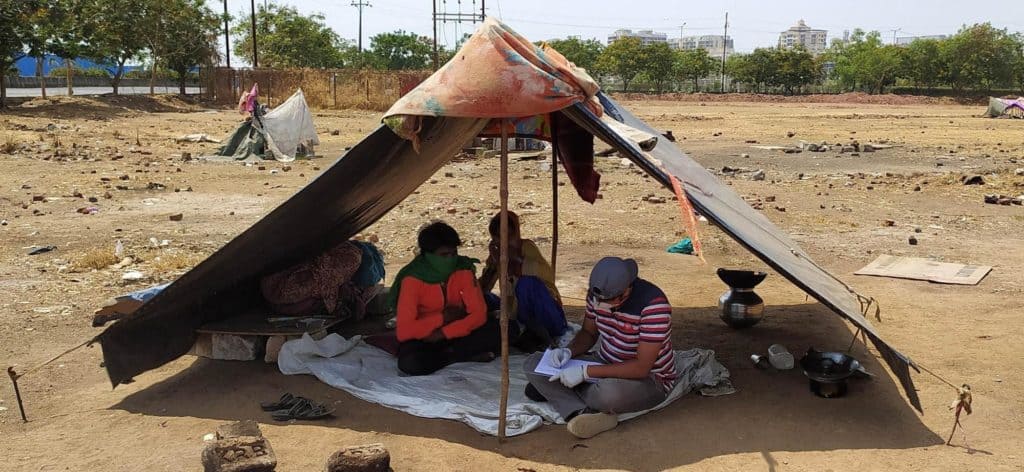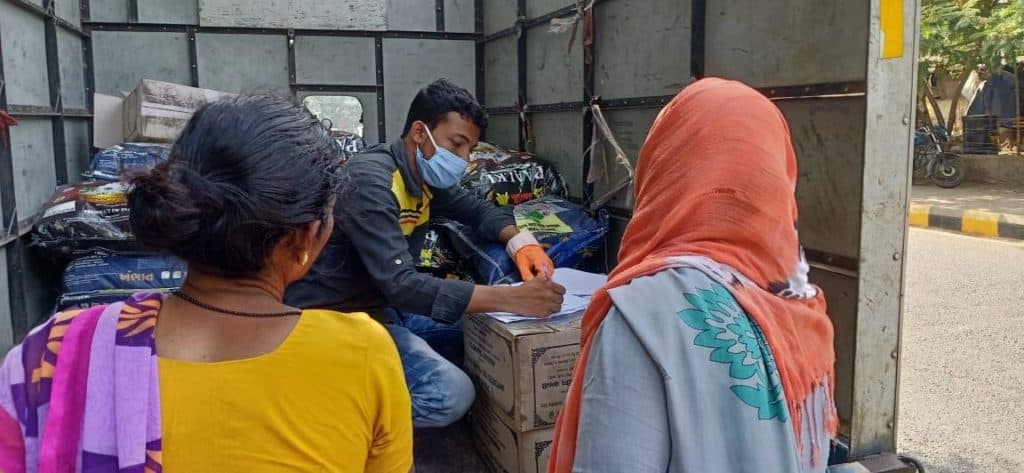This is the second story in a multi-part series on the pandemic and its impact on people in the Mumbai Metropolitan Region, YUVA, a non-profit organisation, attempts to understand the challenges they face in accessing relief and assesses the rights-based approach to benefits.
When the pandemic magnified insecurities of vulnerable populations, youth groups across the city rose in response, spearheading multiple efforts for timely relief, access to information for communities and more.
“In March 2020, as part of the COVID-19 rapid assessment survey by Youth for Unity and Voluntary Action (YUVA), I visited a family where a woman was feeding her young child just rice mixed with chilli powder.” says Siddhant Mhatre, a 22 year old youth from Nerul, Navi Mumbai who has been working with YUVA. “When I asked her why she was doing so, she said that after she lost her job, she was glad that she at least had rice at home. I knew then that the situation is already bad and it is only going to get worse and we have to be prepared.”
Young people have a different dynamic with families staying in the basti, according to Ajay Borkar from YUVA. “Women do not openly speak to men from other households and vice versa. But we are able to approach everyone without any hesitation,” he says.
When cyclone Nisarga hit the city, a house in Panchsheel Nagar, Belapur, was completely destroyed due to the strong winds. The youth members visited door-to-door in the community, collecting donations to support the affected family.
In Ambedkarnagar, Malad, Sunil and members of the youth collective Samyak, mindful of the need for better hygiene at this time, have been advocating for clean water, public toilets and proper waste disposal systems in the community. With the pressure exerted by them on authorities through letters and social media platforms, the community toilets are now being sanitised regularly. Sunil says, ‘For 30 years, we have been making the same demand. A primary precaution to reduce the spread of COVID-19 is frequent hand washing. But how can we do that if we don’t have access to water? We need legal electricity connections too and all other basic services’.
Bridging the knowledge gap
When COVID-19 was still not as commonly understood in settlements, the knowledge gap about the disease was met with regular door-to-door awareness drives conducted by the youth.
Ekta Vichar Manch, a youth collective in Navi Mumbai facilitated by YUVA, devised a unique way to build awareness of the disease in their community. ‘The members of our youth group, who stay in different lanes of the basti, each took the responsibility of supervising their lane to ensure that precautions were being taken, people were regularly washing hands, and physical distancing was being maintained to the extent possible,” says Rishikesh Pawar, a group member. “In our weekly meetings, we discussed the situation in our lanes and came up with ways to further increase awareness.”
The news of the pandemic brought with itself misinformation and rumours which, if not controlled soon, were enough to cause chaos and panic in these densely populated settlements. ‘The COVID-19 situation was evolving by the second, and therefore, we checked social media and news platforms on our phones and approached the local corporator whenever needed and simultaneously circulated the updated information we received in the community. We knew that this had to become a regular and necessary activity’, adds Rishikesh.

Relief and rehabilitation
When the realisation seeped in that the pandemic was here to stay and securing ration access was an immediate need of the community, members of many youth collectives across the city started collating a list of families who needed support, starting with the most vulnerable first and began approaching the city municipal corporations, nonprofits and other supportive bodies.
Members of the Malwani Yuva Parishad, a youth collective in Ambujwadi facilitated by YUVA, began the #fightagainsthunger initiative in their area. They distributed ration kits and served khichdi to hundreds of people in the community. “If our officials can reach out to each one of us when they need our votes, why have they forgotten us when we need them the most?”, says Asma Ansari, a member of the group.
Some youth had already heard of local leaders providing ration to people they knew in a nearby settlement. ‘When we heard of the biases, we had to ensure that it doesn’t happen in our basti’, says Rishikesh.
Umang, another youth group working in Santacruz, supported people’s need for food and basic supplies. Explaining youth-led strategies during the distribution process, Sameer Khan a member of Umang says, “when the ration distribution resulted in crowding, flouting physical distancing norms, we stopped distribution and resumed late in the night, requesting each beneficiary to come to a designated spot and collect their ration kit.”

On learning about the Government Resolution (GR) released by the Maharashtra government in May 2020 whereby non-ration card holders would receive ration on Aadhaar cards, Ekta Vichar Manch members decided to conduct a camp in the basti to speeden the form filling process. They managed to fill forms for 60 families and submit them to the Vashi ration office.
Youth groups show how they can function as changemakers in their community, building self-sufficiency, furthering participation, leadership and accountability.
‘We don’t want someone external to fight our battles. We feel we are well equipped to do so’, says Mittal Nishad,a member of Ekta Vichar Manch.